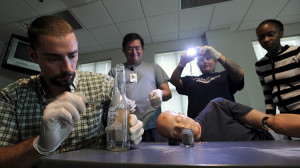New Criminal Justice Associate of Science is Approved

STC Associate Degree offers pathway to Armstrong Bachelor of Science
SAVANNAH – For Lora Schroeder and Mya Robertson, it is the end of the beginning – the beginning of their academic pursuits in justice-related studies. These women, both studying Criminal Justice at Savannah Technical College, are preparing to make their way from completing the associate degree onto baccalaureate study at Armstrong, thanks, to a newly-minted articulation agreement between the institutions. Both students want to work in the juvenile justice system.
Last week, the University System of Georgia (USG) Board of Regents and Georgia board of the Technical College System of Georgia (TCSG) approved the first completely transferrable degree between Savannah Technical College and Armstrong with STC’s Criminal Justice Associate of Science Degree. This 65-hour program offers students a seamless educational pathway for criminal justice students to continue their education at Armstrong.
For Lora, who is a certified child development specialist with experience working with the Bryan County Schools, getting involved professionally with the juvenile justice is the best way to help children. “It’s easy to empathize with children and make a difference in their behaviors at an early age,” she says. “Being delinquent doesn’t mean that you’re bad, it just means that you need help and no one’s been helping you.” Lora was drawn to this career field because of the stability, variety and sense of purpose it provides. She also likes the feeling of contributing to others and making life better for them and for the community.
Mya, who worked in banking for ten years before the economic downturn, is enthusiastic about the possibilities. “When I decided to go back to school, it was the easiest thing I’ve ever done,” she notes. “From testing, to scheduling to completing the program – everything has just fallen into place for me. I know it’s the right thing for me to be doing.”
Both considered continuing their studies with a prestigious university in the state that offers online study. For her part, Mya had reservations. “But I knew that I needed to be in class. I’m not an online learner, so having the opportunity to continue at Armstrong is perfect for me,” she says.
Both women have externships remaining during which they work 20 hours in an agency or in the courts. Says Mya, “That’s where we will really see how to implement what we’ve learned. It’s the start of a new career for me and my family.”
In addition to general core courses, the program will feature 18 semester hours in criminal justice-related coursework – including introduction to criminal justice, principals of law enforcement, ethics and cultural perspectives, corrections, criminal law and constitutional law.
Savannah Technical College’s Criminal Justice program is a sequence of courses that prepares students for Criminal Justice professions. The program emphasizes a combination of theory and practical application necessary for successful employment. The Criminal Justice field offers thousands of career opportunities in the three components of the criminal justice system: Law Enforcement, the Courts, and Corrections, as well as careers in private security. For more information visit www.savannahtech.edu/CriminalJustice.
The Department of Criminal Justice, Social and Political Science at Armstrong offers the Bachelor of Science in Criminal Justice. This degree consists of core courses in the administration of justice, criminology, ethics and criminal procedure coupled with a concentration in juvenile justice, law enforcement, research methods, penology and law. Coupled with relevant work experience, the degree sharpens the candidate’s competitive edge for state and federal law enforcement openings, court administration positions, and state and federal probation and parole positions. In addition, the degree is invaluable for mid-career advancement.
Thanks to an agreement signed in 2012 by the USG and TCSG, there are 27 core curriculum courses transferable to USG institutions from TCSG institutions accredited by the Southern Association of Colleges and Schools Commission on Colleges. These 27 courses offer more options for TCSG students to pursue baccalaureate degree opportunities at USG institutions.
###
#1440 | April 21, 2014
Media Contact: Amy Shaffer, APR
912.443.5512 or ashaffer@savannahtech.edu
Savannah Technical College serves Coastal Georgia with quality, market-driven technical education with campus locations in Chatham, Effingham and Liberty Counties. Serving more than 10,000 credit and non-credit students annually, Savannah Tech offers nearly 150 different instructional programs in Aviation Technology, Business and Professional Services, Industrial Technology, and Health Sciences in addition to Adult Education classes, industry-specific training and continuing education. The College serves as an economic and community development partner for the region, offering corporate and customized training and assessment programs for business and industry.
Savannah Technical College is accredited by the Southern Association of Colleges and Schools Commission on Colleges (SACSCOC) to award associate degrees, diplomas and technical certificates of credit. Questions about the accreditation of Savannah Technical College may be directed in writing to the Southern Association of Colleges and Schools Commission on Colleges at 1866 Southern Lane, Decatur, GA 30033-4097, by calling (404) 679-4500, or by using information available on SACSCOC’s website (www.sacscoc.org).
